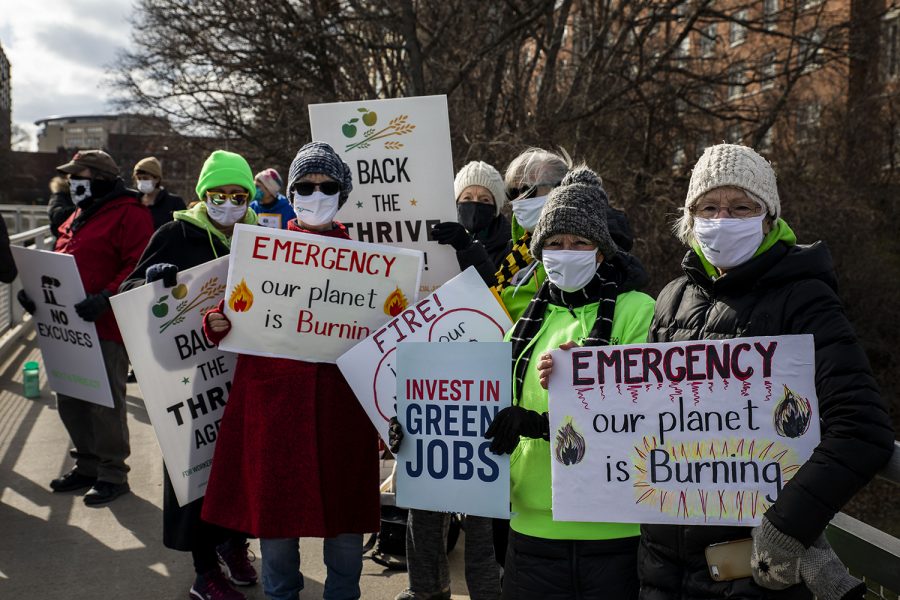Opinion | Biden’s plan to reduce greenhouse gas pollution by 2030 is the ambitious climate action we need
Compared to the consequential disregard of the environment by Trump, President Biden’s call for hasty climate action is a refreshing, necessary change.
A group of people pose for their portraits and to show their signs on Wednesday, March 31, 2021. Iowa Citizens for Community Change held the rally on the Riverside Dr. overpass.
May 5, 2021
When Donald Trump left office, environmentalists and nature lovers across the nation were able to let out a brief sigh of relief. Throughout his term, Trump trampled over and tossed countless environmental efforts and policies to the curb; most notably removing the U.S. from the Paris Agreement, a worldwide collective set of climate goals.
Considered the “Worst President for our Environmental History,” Trump left behind careless destruction to the environment, a large disadvantage to implementing successful climate-correcting efforts, and defamation to the nation’s climate mitigation credibility in his wake.
After four years of potentially irreversible damage, President Joe Biden is changing course and taking immediate action. On day one of his presidency, Biden rejoined the Paris Agreement, showing the nation and the world that the U.S. is back to combat not only climate change, but also the lack of environmental responsibility Trump permitted for so long.
During the recent Leaders Summit on Climate Change, Biden committed to reducing greenhouse gas pollution through an emission target of 50 to 52 percent by 2030. This plan, known as the Nationally Determined Contribution (NDC), is based around a complete shift to sustainable industrial infrastructure and an equitable, clean energy revolution.
According to an article from Scientific American, the White House said it wants to showcase “the economic benefits of climate action, with a strong emphasis on job creation, and the importance of ensuring all communities and workers benefit from the transition to a new clean energy economy.”
Biden’s $2 trillion infrastructure plan entails a complete update of the electrical grid to be more resilient to climate disasters, a boost in the electric car market while shifting away from gas-powered cars, the creation of carbon-free power plants, revision of public transportation systems, and much more.
This plan will also create millions of jobs such as the construction of new infrastructure, capping abandoned wells and reclaiming mines to stop methane leaks, engineering energy-efficient technology innovations, and establishing research positions for further changes.
With the negative effects of climate change looming over the nation like a ticking time bomb, Biden’s plan provides the foundation we need to fight back now more than ever.
However, it seems some American citizens are too hung up on the price of the infrastructure plan to see the true expenses of climate change.
We are currently living through a decisive decade, in which our actions truly will make or break our ability to survive on this ever-warming planet. Cost should not determine threat to human lives. However, if we are unable to prevent global temperatures from increasing 1.5 degrees Celsius by midcentury, we risk much more severe weather patterns, population displacement, health effects, and threat to food and water security, therefore higher prices in restoration.
When comparing the costs of climate change, $2 trillion is a relatively small proactive sum relative to other expenses. For example, this year the military budget is estimated to spend $934 billion between October 1, 2020, and September 30, 2021. From this perspective, a $2 trillion budget for the next nine years is not unreasonable. And, when considering the U.S. military itself has a larger carbon footprint than multiple industrialized countries per year, it is quite obvious that it’s not only the spending that is excessive.
It is sad that we must consider a president simply believing in science to be a win. However, Biden’s strong-willed belief and climate mitigation efforts are a welcomed step toward preserving our nation and the world. Although the NDC plan must pass through Congress, its innovative ideologies of sustainable development are a symbol of hope in a degrading environment.
So, the $2 trillion question is: will the nation recognize this crisis too, before it is too late?
Columns reflect the opinions of the authors and are not necessarily those of the Editorial Board, The Daily Iowan, or other organizations in which the author may be involved.














